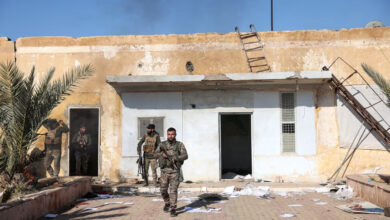
Syrian government troops have broken through a six-month rebel blockade in northern Syria and are now fighting to recapture a vital highway, opposition and state media said on Monday.
Rebels had kept the army bottled up in the Wadi al-Deif and Hamidiya military bases in Idlib province. But on Sunday, President Bashar al-Assad's forces outflanked the rebels and broke through, the pro-government al-Baath newspaper said.
The insurgents counter-attacked on Monday but their front has been weakened in recent weeks due to infighting and the deployment of forces to other battles, activists said.
The break-out from the bases, located outside Maarat al-Nuaman town, may enable the army to recapture the main route into Aleppo, Syria's largest city, and bolster their fragile supply lines in the heart of the rebel-held north.
Two years into the uprising against Assad, government forces are fighting hard to maintain control of cities. Many rural areas and provincial towns have fallen to the rebels. Aleppo, formerly a business hub, is locked in a stalemate between the rival forces.
Rebels had advanced in northern Syria, near Turkey, and southern Deraa province near Jordan. But government forces have kept the rebels out of central Damascus and hold more than half of Homs city, which links the capital to Assad's Alawi heartlands near the Mediterranean coast.
March was the bloodiest month yet in a conflict which began as a protest movement against four decades of Assad family rule but has descended into an increasingly sectarian civil war in which at least 70,000 people have been killed.
Sunni Muslim rebels are the backbone of the insurgency, while minorities like the Alawis, from an offshoot of Shia Islam, have largely fought with Assad, who can count on outside support from Russia and Iran.
Western powers, who want to see the end of Assad but do not want to intervene militarily, have been alarmed by the advance of Islamist groups like the Nusra Front in a conflict which has deepened the Middle East's sectarian divide.
Diplomatic efforts to find a political solution have gone nowhere.
Break the blockade
Rebel attacks had forced the army to relinquish many bases in northern Syria and most roads around Aleppo and Idlib province, leaving the remaining government-controlled areas in the north to rely on airlifts for food and weapons.
"The break of the blockade yesterday allowed the army to drive six lorries full of weapons to get into the bases of Wadi Deif and Hamidiya," Rami Abdelrahman, head of the British-based Syrian Observatory for Human Rights, told Reuters.
The pro-opposition observatory said that despite the army gains, neither side had a clear advantage.
Abdelrahman counted more than 50 fighters dead or missing from the battle on Sunday. The army advance was not yet a decisive victory but could reopen battlefields in the north where rebels had the advantage, he said.
"We will see now what happens but if the rebels can push back the regime, they can avoid a major setback. If the regime is able to hold this opening it could take back the whole road and that will have major strategic consequences," he said.
Activists in Maarat al-Nuaman, which has faced daily air strikes due to the blockade, accused rebels of causing their own defeat by depleting their forces in the area.
Islamist units that moved in over the weekend accused forces on the ground, led by the Martyrs of Syria brigade, of failing to secure the base and sending away too many fighters.
The Martyrs of Syria brigade said they were pushing their campaign and the Islamist groups had hurt their blockade by interfering.
According to Abdelrahamn, many of the main fighting units previously based in the area had moved to Raqqa, Ras al-Ain, and Hassakah, towns in the northeast which rebels recently seized.
Government forces have pushed hard near the cities of Aleppo, Idlib and Damascus in recent weeks.
An air strike killed 13 people, including 10 children, in the Damascus district of Qaboun on Sunday, the Observatory said.
Activists showed video footage of a boy, his face and arms blackened and bloodied and his leg bandaged, and a photograph of the bodies of three children in blue plastic body bags.
The fighting in Syria has also spilled over with increasing frequency into neighboring Lebanon.
Two people, one of them a 13-year-old boy, were killed in the Lebanese border village of Qasr on Sunday by rocket fire from rebel-held positions in Syria, a Lebanese security source said. Six people were wounded.
Lebanese President Michel Suleiman condemned the bombardment, which he said "killed innocent Lebanese who have no connection to the conflict taking place outside their country.”




